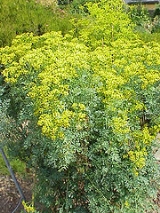
Rue
WordNet
noun
(1) (French) a street or road in France
(2) Sadness associated with some wrong done or some disappointment
"He drank to drown his sorrows"
"He wrote a note expressing his regret"
"To his rue, the error cost him the game"
(3) Leaves sometimes used for flavoring fruit or claret cup but should be used with great caution: can cause irritation like poison ivy
(4) European strong-scented perennial herb with grey-green bitter-tasting leaves; an irritant similar to poison ivy
verb
(5) Feel remorse for; feel sorry for; be contrite about
WiktionaryText
Etymology 1
Old English hrēow, from Germanic. Cognate with Dutch rouw, German Reue; related to Etymology 2, below.
Noun
Etymology 2
Old English hrēowan, perhaps influenced by , from Germanic. Cognate with Dutch rouwen, German reuen.
Verb
- To cause to repent of sin or regret some past action.
- To cause to feel sorrow or pity.
- To repent of or regret (some past action or event); to wish that a past action or event had not taken place.
- I rued the day I crossed paths with her.
- To feel compassion or pity.
- Late C14: Madame, reweth upon my peynes smerte — Geoffrey Chaucer, ‘The Franklin's Tale’, Canterbury Tales
Etymology 3
From Old (and modern) French rue, from Latin ruta, from Greek ῥυτή.
Noun
- Any of various perennial shrubs of the genus Ruta, especially the herb Ruta graveolens, formerly used in medicines.

